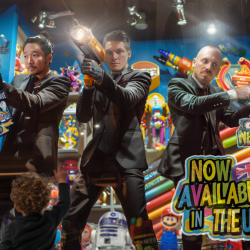It’s a tale as old as online advertising…
The promise of F16-level targeting accuracy, followed by ads for things that are completely irrelevant. So if the system is so good (and, let’s face it, if it wasn’t somewhat effective, the ad industry wouldn’t be giving all its money to Google and Facebook) why is our experience of it so bad? There are many reasons, but the main one didn’t occur to me until recently. There may not actually be a 100% relevant ad waiting to be served up to you, but the space still has to be filled, so you get whatever is closest. The programmatic ad system is a fascinating process of tiny auctions that last milliseconds, providing winners who then go on to have their ads placed on your favourite websites. If, however, those winners happen to be companies that are basically irrelevant to you, that’s what you get.
The auctions and placements lean towards ads that might be of interest to you, but that can never be an exact science because human beings have never been entirely predictable. Leaving aside the issue of ‘I’m looking for a flight to Las Vegas, but if no-one is running an ad for flights to Las Vegas I’m not going to see one’, we should always bear in mind that people want and need different things from minute to minute, and situation to situation. If you buy a flight to Vegas, ads for flights to Vegas become instantly irrelevant to you, but the algorithm may not have caught up to that piece of information. So it might continue to serve you Vegas flight ads, leaving you exasperated at how irrelevant your online ads are. It’s like a more up-to-date version of what happened ten years ago, when you’d buy a shirt then receive nothing but shirt ads (often for the very same shirt you just bought) for the next week.
The system has improved, but it’s far from perfect.
Part of the problem is that the bar is now so high
No one complains that billboards or TV commercials are not 100% relevant. We expect them to hit the outer rings of the target, or even to miss the target entirely. But online advertising is an entirely individualised experience, which has been honed over decades, so when it falls short it looks far more incompetent. And we have a love/hate relationship with that relevance anyway. We think it’s odd/amateurish/disappointing when we receive ads for sticky tape that can repair a motorcycle seat.
But if we lived in a Minority Report (2002) world, where ads addressed us by name and knew our every waking need the moment it happened, we’d find that intensely intrusive and downright creepy. Besides all that, the point of advertising isn’t always to find the people who definitely want washing powder at the exact second they see the ad. It can also help to pique your interest about something you were otherwise unaware of. For example, maybe you’re the type of person who might be vaguely interested in crypto currencies. So the algorithm spots that, and you then get served ads along those lines. But your degree of interest might still be a long way from the level of actually spending any money in that direction.
So that ad might go from 10% relevance today to 50% relevance next month, and the advertising itself might contribute to that growth in your interest, and its own relevance.
This is the intrinsic problem with relevance in advertising: we’re only human. That means our wants and needs are constantly shifting, and the idea that they can meet the available advertising at the perfect moment is optimistic at best. Perhaps at some point in the future we’ll have ads that really can speak to us with exactly the degree of relevance we need, exactly when we need it, but for now we should just accept that online ads are still trying to hit a target with one hand tied behind its back.
Featured image: cottonbro studio / pexels


























